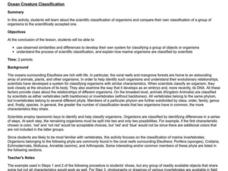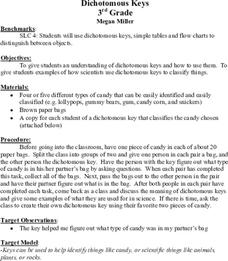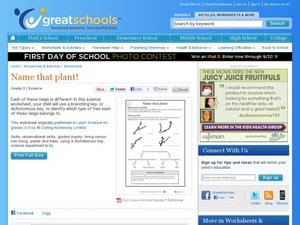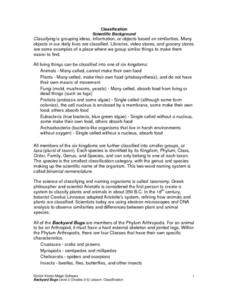Curated OER
Classification
Students complete an animal classification activity. In this classification lesson, students learn about the seven classification levels of animals. Students are given several animal sheets in which they separate 12 animals and run them...
Curated OER
Ocean Creature Classification
Pupils develop a Taxonomic Key for marine invertebrates from pictures they are given after practicing together with common objects, such as shoes. They then compare their key to a provided Ocean Invertebrates Taxonomic Key.
Curated OER
Classification 2
Students discuss what makes a living thing (for example, cellular respiration) and collect a selection of living things from outside. They divide their organisms into plants and animals and create a key for the divisions.
Curated OER
Dichotomous Keys
Young scholars classify objects and organisms using a dichotomous key. They are shown a demo by the teacher and then practice on their own. They discover why classification is important.
Curated OER
Classification of Pasta, Rice and the Nine Planets
Eighth graders create a classification system of the planets and give a written rational for their choice of categories. For this investigative lesson students participate in an activity that helps them to explore classification.
Curated OER
Ocean Creature Classification
Students develop their own system for classifying a group of objects or organisms using observed similarities and differences. They investigate the process of scientific classification, and explain how marine organisms are classified by...
Curated OER
Invertebrate Classification Challenge
Sixth graders practice invertebrate classification using the organisms that are discussed in their textbooks. In this classification lesson students work in teams to classify organisms.
Curated OER
Animal Families
In this animal families worksheet, students match the name of a baby animals to the adult name. Next, they match the name of the animal to the name of its animal group, such as herd, pack, gaggle, etc. There are 15 baby animal names,...
Curated OER
Introduction To the Classification of Organisms
Students discuss how scientists classify organisms. In pairs, they analyze and label "specimens" of breakfast cereals in order to classify them into the correct group. They create a dichotomous key for several species of animals.
Curated OER
Dichotomous Keys
Third graders practice using dichotomous keys. They discover why scientists use them and why it is important to classify animals. They use candy to practice classifying objects and move on to classifying animals.
Curated OER
Creating a Dichotomous Key for Families of Idaho Butterflies
Students are shown how to use the butterfly section of the Digital Altals of Idaho. They discuss how to make a dichotomous key. Students use their skills of observation and recognize defining characteristics that distinguish different...
Curated OER
Building a Dichotomous Key
Students analyze how a dichotomous key helps us explain and identify unknown organisms. They design and construct a dichotomous key, developing a list of three observable characteristics per organism.
Curated OER
Dichotomous Key
In this species worksheet, learners use a dichotomous key to identify the 8 different species of "Norns," a fictitious animal group.
Curated OER
Name that plant!
What is a dichotomous key? When your kids ask, hand them a learning exercise like this one, to explain it. They use the key to identify four different trees, based on the budding twigs they've produced. Tip: Have learners extend this...
Mr. Jones's Science Class
Periodic Table Project
Don't be fooled by the title; this is not really a lesson on elements. It is a project on classification, using the periodic table as an example. For that reason, it could be used in any branch of science. As an example, a group may...
Curated OER
Backyard Bugs
Explore the concept of scientific classification and the similarities and differences between plant and animal species. Your class will participate in hands-on activities by investigating dichotomous keys and classifying their shoes. To...
Curated OER
Name that metal!
Learners have to have had some experience with metals prior to using this worksheet. They are given five properties common to five different metals. They create or use a dichotomous key to identify the five mystery metals. Tip: This...
Curated OER
Tangerine: Cubing Strategy
Here's an activity that uses a reading comprehension strategy based on Bloom's taxonomy to focus readers' attention on key passages from Edward Bloor's Tangerine. Worthy of a place in your curriculum library.
Alabama Learning Exchange
What You Know About the Bermuda Triangle?
Get lost in the classifications. Using the backdrop of the Bermuda Triangle, pupils classify it by angle and side measures. They also learn information about the triangle and its history.
Curated OER
Identifying Creatures
Learners use a classification key from a provided worksheet to identify creatures. This task assesses student's abilities to interpret data, make decisions, identify, and classify.
Curated OER
Classify UT Plants and Animals
Students practice using 2 different plant classification keys to identify species. They make choices between the similarities and differences between their object and the classification scheme.
Curated OER
What Should You Know about Classification?
Many learners have a tough time picking out pertinent information from a text or in class. Sometimes, all it takes is a study/reading guide to show them the way. The worksheet here focuses on taxonomy and classification, including...
Scholastic
Study Jams! The Kingdoms of Life
Zoe and RJ discuss the way scientists classify organisms into five kingdoms. Characteristics of each group are highlighted within their conversation and with text. First-time taxonomists can view the animation at home, take the...
Intel
Insects: The Good, The Bad, The Ugly
What would the world be like with no insects? Ponder this question using a research-based STEM unit that encourages scholars to investigate insects from both a beneficial and hazardous perspective. They learn about insect behaviors,...
Other popular searches
- Classification Keys Fish
- Classification Keys Plants
- Classification Keys Food
- Classification Keys Dogs
- Classification Keys Drafting

























